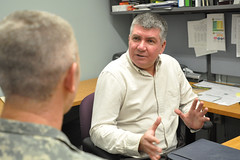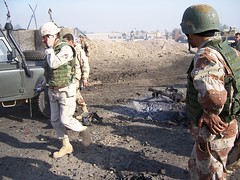Story by David Altom, Kentucky National Guard Public Affairs
[caption id="" align="alignleft" width="240"]

Floyd Hunsaker is a former Kentucky State Trooper who brings his experience and expertise to help Soldiers who have suffered post-traumatic stress injuries. (Photo by David Altom, Kentucky National Guard Public Affairs)
FRANKFORT, Ky. – Ten years of war has transformed the Kentucky National Guard in ways that haven’t been evident since the days of Vietnam and even World War II. After mobilizing more than 14,000 Soldiers and Airmen on two fronts, with missions as diverse as aviation and airlift support, force protection, convoy security and special operations, this organization has developed a history of service that is second to none.
There is price for fighting wars, however. And it is always paid by the individual man or woman in uniform. Physical injuries, mental stress, months away from home in austere conditions under a constant threat of attack, all of these elements shape a Soldier’s behavior and their perspective on the world. The challenge comes when it’s time to head home; switching from the battlefield to “Fort Living Room” isn’t an instant process. In many cases the transition is never addressed in proper fashion … and that’s when problems at home arise.
It’s the job of professionals like Floyd Hunsaker to help Kentucky’s Citizen Soldiers make that much needed transition. Hunsaker is the Director of Psychological Health for the Kentucky Army National Guard. A licensed therapist, it’s his job to identify and assess problems with Soldiers, and then find help for those who need it.
[caption id="" align="alignright" width="240"]

Separating the battlefield from the home field -- Troops oftentimes bring the stress of war home with them and that's not always properly addressed, says Hunsaker. (File photo)
“We’re here to help Soldiers any way we can. If we can’t help them we’ll find the right person that can,” said Hunsaker. “Just give me a chance, that’s all I’m asking.”
Hunsaker is an expert on what he calls “post-traumatic stress injuries.” Early in his 26 year career in law enforcement he was involved in a shootout and suffered multiple gunshot wounds. He emerged victorious in the gunfight, but that didn’t make his recovery easy. Based on that experience he went on to establish a program for the Kentucky State Police that addressed the needs of troopers who suffered physical and mental injuries in the line of duty.
“I know what it’s like to get shot, I know what it’s like to undergo physical therapy,” he said. “That helps me identify with Soldiers who’ve been deployed.”
“I want to make sure they don’t have to go through what I did,” he said.
Hunsaker said the personalities of police officers and Soldiers who’ve been under fire are similar.
“They can be distrustful and think they don’t need any help and they don’t like to show any sign of weakness,” he said.
That’s all right on the battlefield, but not necessarily on the homefield. He compares a behavior injury with a physical one.
“If you break your arm you need to get it fixed. The same goes for your mental health.”
Hunsaker is very protective of the Soldiers he works with. Referrals and counseling are strictly confidential. No one from a Soldier’s unit is ever contacted and the commanding officer is not informed if a Soldier seeks out help.
“This has no impact on the Soldier’s career,” he said. “We want to help them recover so they can go on to productive lives and as military professionals.”
If you need help or you know some who does, contact Hunsaker at floyd.hunsaker@ceridian.com or call him at 502-330-2041 or 502-607-1939.